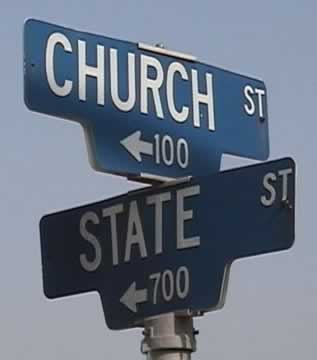Much has been said about the often bandied phrase "separation of Church and State". This separation is often seen as something natural, ordained by God to prevent the sad history of bloodshed brought about by bringing politics under religious influence. Religion is thus seen as a destructive force, and secularism is harmful (as Christohper Hitchens once argued) only insofar as it is pursued like a religion.
It is important to take a step back from such ideological debates and ask, as William Cavanaugh did in his The Myth of Religious Violence, one small but important etymological question: is the word "religion" the same now as it was in the medieval and even classical period. In other words, has the definition of religion remained a term that is transhistorical, transcultural, and transpatial? The argument that religious influence on politics is a regressive step can only work if such a definition of religion is true.
Probably influenced by the intellectual archeology of Michel Foucault, Cavanaugh puts forward a compelling genealogy of the word "religion" to show that, rather than being a freestanding term, independent of culture and history, "religion" is actually historically and culturally contingent. More specfiically, it is unavoidably bound up in shifts in the configurations of power. So bound up is this term with power that to entertain the idea that you can have an understanding of "religion" that is free of any configuration of power, argues Cavanaugh, is itself the product of a submission to a hierarchy of power.
But very importantly, Cavanaugh goes onto argue with Talal Asad that religion currently conceived has been stripped of a very important component, its spatial manifestation in an embodied society. There seems now to be a conception of society that is in its natural state free from any religion. Society is seen as naturally secular. This notion of "religion" and "society", implies Cavanaugh, along with other historians of religion, is actually a product peculiar to the West, and inextricably tied to the rise of the modern nation state. It is the state, argues Cavanaugh, that defines what counts as "religion", because it wants to maximise control over "society". Set in this context, religion has become associated with belief because the machinations of state power have stripped religion of any societal manifestations, forgetting that "religion" in the classico-medieval definition implicates societies of committment and virtue, what Talal Asad regards as "a program of disciplinary practices" enacted in real space and time.
The implications of this genealogy are massive, for in debates over the separation of church and state Christians will do well, as Matthew Tan will soon argue in an upcoming first installment of the Seminars in Political and Religious Life series, to avoid submitting to the terms set by the nation state. To call for freedom of "Religion" may actually amount to a ceding to the discursive cage set by the state. "Religion" is bad for you not because it violates the natural secularity of society, but because "Religion" defined as mere belief cut off from society is an emaciated witness to Jesus Christ, and a proper defense of religion must involve a proper appreciation of its spatial implications. This in turn means not only a rejection of an emaciated "religion", but also a rejection of a naturally secular societal space.
This is not necessarily a return to chauvinism, as the screeching banshees of the secular commentarati would have it, but a proper recognition of the embodied nature of the Body of Christ, which is broken in real space and time for the life of the world. Indeed, Christians must also be wary of thinking back romantically on pre-modern notions of spatial religion, for even that might risk ceding to the supremacy of secular discourse, where a sacramental logic no longer has anything unique to offer to a naturally secular society.
